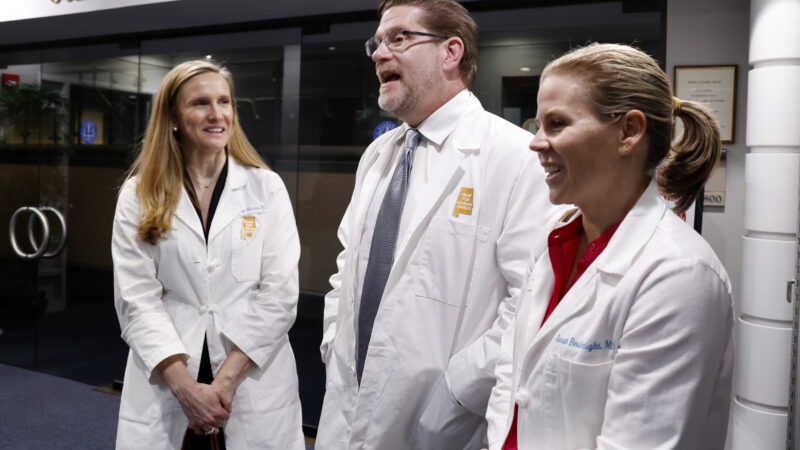Two Alabama IVF providers resume treatment under new law
Dr. Mamie McLean, left, Dr. Michael Allemand, center, and Dr. Janet Bouknight, right, react after the Senate passed SB159 bill (IVF Fertility Bill), Wednesday, March 6, 2024, in Montgomery, Ala.
Many fertility providers and patients across Alabama are breathing a cautious sigh of relief in the wake of a new state law that aims to protect access to in vitro fertilization services.
“I am absolutely thrilled to say that we are back to our full scope of IVF treatment for all of our patients,” said Dr. Beth Malizia, reproductive endocrinologist with Alabama Fertility.
Officials with the University of Alabama at Birmingham (UAB) said in a statement they also plan to restart IVF procedures in light of the new legislation.
Alabama Fertility and UAB are two of three clinics that stopped IVF services in the wake of a state Supreme Court ruling that defined frozen embryos as children.
The court decision, based on a civil law from 1872 and drawing on language from a 2018 constitutional amendment, sparked legal concern and confusion among medical providers and fertility patients.
Facing widespread pushback, state Republican lawmakers fast-tracked a bill they say offers a temporary fix for IVF clinics.
The legislation, signed into law by Governor Kay Ivey Wednesday, grants civil and criminal immunity to providers involved in the “damage or death of an embryo” during IVF procedures. It does not address the legal status of frozen embryos. Lawmakers said those issues could be debated at a later time.
“IVF is a complex issue, no doubt, and I anticipate there will be more work to come, but right now, I am confident that this legislation will provide the assurances our IVF clinics need and will lead them to resume services immediately,” Ivey said in a statement.
But the law does not provide enough protection for providers at the Center for Reproductive Medicine (CRM), the clinic at the center of the lawsuit that made its way to Alabama’s Supreme Court.
“We are not reopening until we have legal clarification on the extent of immunity provided by the new Alabama law,” officials with CRM wrote in a statement. “At this time, we believe the law falls short of addressing the fertilized eggs currently stored across the state and leaves challenges for physicians and fertility clinics trying to help deserving families have children of their own.”
Michelle Howard, a patient at CRM who is pregnant with her first child after undergoing IVF, said she is sad her clinic is not resuming IVF treatments, but she is excited for patients at other clinics across the state.
“I feel like the fight is definitely not over,” Howard said. “But I feel like we took a step in the right direction.”
Gabbie Price, who hopes to begin her first cycle of IVF in the coming weeks, said the new law offers a “band-aid solution” while lawmakers figure out how to more directly address the Alabama Supreme Court ruling and topics related to embryonic personhood.
“Those are conversations that are going to take days, weeks, months,” Price said. “The majority of these patients don’t have that.”
Price and Howard are part of a coalition that came together in recent weeks to advocate for IVF protections. The group, which includes fertility specialists and patients, hopes to remain part of future discussions in Montgomery.
“I think there’s still work to be done,” Malizia said. “And I think there are still lawmakers and others that have misconceptions about what IVF is and what we do and what type of conversations we have in our office.”
This story was updated March 8, 2024 to include a statement from the Center for Reproductive Medicine.
Bill making the Public Service Commission an appointed board is dead for the session
Usually when discussing legislative action, the focus is on what's moving forward. But plenty of bills in a legislature stall or even die. Leaders in the Alabama legislature say a bill involving the Public Service Commission is dead for the session. We get details on that from Todd Stacy, host of Capitol Journal on Alabama Public Television.
My doctor keeps focusing on my weight. What other health metrics matter more?
Our Real Talk with a Doc columnist explains how to push back if your doctor's obsessed with weight loss. And what other health metrics matter more instead.
Baz Luhrmann will make you fall in love with Elvis Presley
The new movie is made up of footage originally shot in the early 1970s, which Luhrmann found in storage in a Kansas salt mine.
Forget the State of the Union. What’s the state of your quiz score?
What's the state of your union, quiz-wise? Find out!
A team of midlife cheerleaders in Ukraine refuses to let war defeat them
Ukrainian women in their 50s and 60s say they've embraced cheerleading as a way to cope with the extreme stress and anxiety of four years of Russia's full-scale invasion.
As the U.S. celebrates its 250th birthday, many Latinos question whether they belong
Many U.S.-born Latinos feel afraid and anxious amid the political rhetoric. Still, others wouldn't miss celebrating their country








